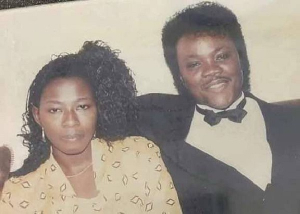POSTHUMOUS SOLUTION Of late there has been a lot of hullabaloo about how expensive funerals have become in this country and their subsequent drain on our already weak economy.
Sometimes we tend to make cross-cultural comparisons without putting the relevant ideological and historical differences in proper perspective. Our culture was in existence thousands of years before Columbus claimed to have discovered America, when in reality he only lost his way to India. The king of soul, James Brown, was buried a few days after his death. Former President Ford's funeral began a day after his demise. These are two great men whose mortal remains would have 'enjoyed' a few months of refrigeration if they had been Ghanaians. However, in their native land it is the norm to be buried as soon as possible. They see no reason why a corpse should be kept for months when families grieve.
Elaborate and expensive funerals have not always been part of our culture; there was a time when people were buried a few days after their demise. This was possible because we lived in small towns and villages where all close relations could be summoned with the bang of a gong-gong or the sound of talking drums.
Needless to say times have changed - it is impossible to get families together that easily. Even though mortuaries are expensive, bodies are kept for long periods of time so that families can plan a fitting funeral, if that makes it expensive so be it.
From the cradle to the grave most people pass through various rites of passage some of which are optional, unattainable or both. The optional ones could include outdoorings, coming of age ceremonies and weddings; these same rites become unattainable when one dies young or when one lives in abject poverty. In fact the only rite that all have to go through are funeral rites and this is one of the reasons why they are seen as very essential.
As far as the average Ghanaian is concerned a funeral is not simply the burial of a corpse, its significance is far deeper than six feet grave in which they are buried. No two funerals are the same; each one tells a different story about the dead, how they lived their life, the respect they command and their place in the afterlife. Most people marry a lot of wives and have so many children simply because they envisage a fitting burial. How can we deny them of their life's ambition! We all know that what constitutes a fitting or expensive funeral is a matter of opinion formed by ones proximity by blood to the deceased.
How long one is kept in a mortuary has become a symbol of class. No one can imagine a deceased chief spending less than a month in a mortuary. The cost of preserving a chief's body is irrelevant. His successor has to show his ability to rule by organizing a "fitting" burial. Some Ghanaians believe that we make the dead angry by not giving them the best funeral.
People even speak of dreams warning them of the consequence of not giving their relatives a grand funeral. As Ghanaians our respect for the sanctity of human life coupled with our strong believe in the existence of the afterlife drives us to please our dead relatives with party-like funerals. It must be noted that not all funerals are as expensive as we are made to believe because not all families can afford them.
The crux of the matter is that dead people do not make expensive funeral arrangements; that is in and will continue to be in the exclusive domain of the living. Only the living have the power to change the system and this can be done if we will be honest with ourselves. Most Ghanaians talk about extravagant spending for funerals yet they secretly wish for a more extravagant one when their time comes. It is not surprising because ones funeral tells a lot if not everything about the life they led. No law can or should be made to regulate how families decide to organize their funerals. If we naively allow that to happen what next are we going to allow the government to regulate, the cost of outdoorings, weddings? In no time they will be making laws about what we should eat because some people's meals are too expensive.
It's unfair for us to blame the dead for extravagant funerals-they had nothing to do with it. Show the dead some respect and do something about your own inevitable funeral while you are still alive for if you die the same thing you are condemning now will be done at your funeral. However, every living Ghanaian has the power to stop this waste of resources. You have the means today to make your funeral as inexpensive as possible. In your WILL state clearly how much you want your family to spend on your funeral. Due to inflation (which was here before you were born and will definately to be around long after you are gone) quote the amount in dollars. Your family will never go against your wishes because, the fear and respect of the dead aside, it will save them money. Families love that! This, I honestly believe, is the most practical way for anyone who honestly believes that funerals are too expensive to protest against the system. The beauty of this posthumous protest is that it is done right from the grave of the protester.















